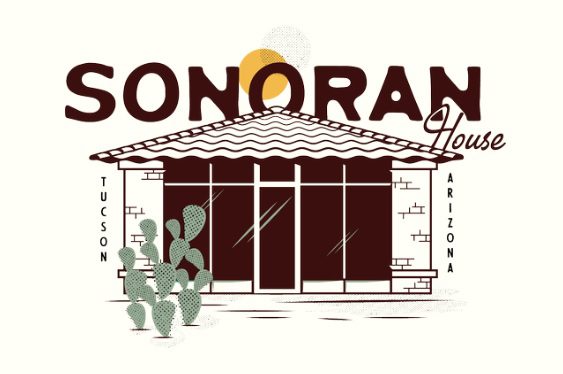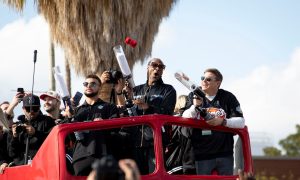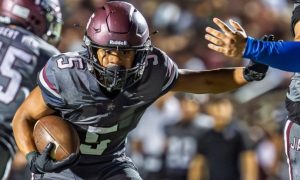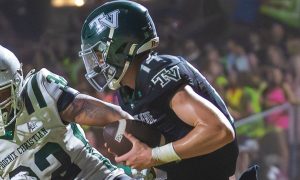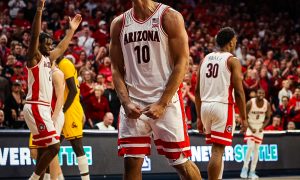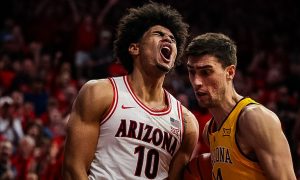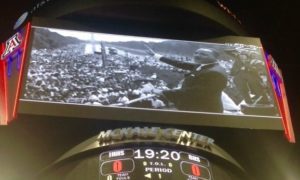|
|
|
>> Greg Hansen columns at Arizona Daily Star
>> Steve Rivera blogs at Fox Sports Arizona
OCTOBER 3, 1998
Fourteen years ago today Ortege Jenkins literally leaped into Arizona football lore. His “Leap by the Lake”, as it was coined by the Arizona media-relations department, in Arizona’s 31-28 win over Washington in Seattle is the most thrilling play in Wildcat history.
The game-winning play placed the game as No. 7 in my Top 50 games list in Arizona history. Here is a rewrite of that post in case you missed it, or better yet, want to relive the memories of what happened on a cold Seattle night 14 years ago today:
Does any individual play in the annals of Arizona football match Ortege Jenkins’ phenomenal “Leap By The Lake” game-winning score against Washington in 1998? Lee Pistor, Brett Weber, Max Zendejas, Gary Coston and Doug Pfaff all made pressure-filled field goals at crucial moments and their names are scattered throughout this Top 50 ranking.
Chuck Cecil, Darryll Lewis, Chris McAlister, and Antoine Cason also made memorable interceptions, and Ricky Hunley and Byron Evans — just to name a few — had significant tackles in key stretches of a game.
The thing about field goal attempts, interceptions and tackles: They are common plays. The accomplishments were very special and brought memorable moments to Wildcat fans, but game-winning kicks, game-saving interceptions and game-turning tackles or sacks occur annually in college football. Nothing is common about a player catapulting into the end zone. When did you see that before Jenkins’ play in college football, and when have you seen it happen since, especially with the game on the line? Myself, never.
The Cincinnati Bengals’ Jerome Simpson somersaulted over an Arizona Cardinals defender into the end zone last season, but that was in the second quarter with Cincinnati leading 10-0. No pressure there. Simpson gets more style points than Jenkins, because he landed on his feet, but Jenkins’ body flipped because of contact with Washington defenders.
Former Arizona coach Dick Tomey said recently during a Bear Down Bias podcast that Jenkins was one of only a few athletes in college football that can make such a play. It is difficult to argue that statement given Jenkins’ athleticism with his basketball backround.
Tomey said in the podcast: “We told (Jenkins) that, ‘This fourth down, you gotta score … if you have to run, you gotta make it. We have no chance to get the clock stopped.”
“He was well aware of the circumstances,” Tomey continued. “The play he made was just a natural, athletic play. He was one of a few guys in college football that year that could make that play.”
The importance of the play was magnified by Arizona’s 12-1 record in 1998, although the Wildcats lost their only game that season the week afterward at home against conference champion UCLA.
My colleague Anthony Gimino, who was at Husky Stadium covering the game for The Arizona Daily Star, recaptured the excitement of the moment recently in his blog at TucsonCitizen.com. The Pac-12 Network was about to air a replay of the Arizona-Washington game as one of its classics. He reprinted an article he wrote about the “Leap by the Lake” in 2008 for the Tucson Citizen print edition.
Here is an abbreviated version of what Gimino wrote in 2008. I recommend that you read it in full by clicking on the link in the previous paragraph. Be ready to feel some goosebumps:
Arizona was at the Washington 9-yard line. Dennis Northcutt and tight end Mike Lucky were split to the left. Malosi Leonard and Brandon Nash were to the right. Washington had 3-on-2 coverage on both sides.
Jenkins took the snap, looking left for Northcutt, his top receiver. Double-covered. He looked right into the end zone. Nothing. Jenkins continued to drift back.
Running back Trung Canidate swung out to the right, taking a defender with him. Also covered. Jenkins, still backpedaling, was in trouble, retreating all the way to the 20-yard line.
His only choice seemed to be an incompletion to stop the clock.
Well, there was one other option.
All the defensive pass coverage was deep or to the outside. The middle was invitingly clear. Jenkins could run. Do or die. Score or lose. Hero or goat.
With Tomey’s words still echoing – “If you run, you better make it” – Jenkins planted his right foot and charged into history.
Jenkins started to run and the coaches in the press box jumped out of their chairs.
“It was like, ‘No . . . no . . . no!” remembered defensive coordinator Rich Ellerson, now the head coach at Cal Poly. “Actually, I was more like, ‘Don’t do that, you . . .’ ”
There’s sometimes a fine line between bravery and foolishness, but Jenkins, who never lacked for confidence, had made his decision, seeking out pay dirt in the purple end zone of Husky Stadium.
“He goes,” says Fox Sports Net announcer Steve Physioc.
As Jenkins reached the 10, Washington defenders Brendan Jones and Marques Hairston came up from the end zone. Linebacker Lester Towns moved in from Jenkins’ right.

Arizona quarterback Ortege Jenkins goes heels over head in the famed “Leap by the Lake” play that gave Arizona a 31-28 win over Washington in 1998 (YouTube video)
Nash watched helplessly from the end zone; there was no one he could block.
“I was thinking, ‘Oh my god, he’s tackled,’” Nash said. “Just for a second, I was thinking, ‘What is he doing?’”
Jenkins knew he couldn’t make it if he tried to dive low. He knew he wasn’t going to run over a big guy like Towns. Only one way to go.
At about the 3-yard-line, Jenkins left his feet.
“He dives!” Physioc yells.
Jenkins could see the goalpost … and then suddenly he couldn’t. All three Washington defenders hit him low, flipping him heels over head.
“I remember seeing the black sky, the stars in the sky,” Jenkins said.
And then he saw the goalpost again.
“HE’S IN!” screams Physioc.
Jenkins landed on his feet in the end zone, tumbled to the ground and popped right back up, having somehow held on to the ball throughout the flip.
“Once I realized where I was, I knew the game was over,” Jenkins said.
Arizona made the extra point and then needed only to kick off to end the game, winning 31-28. The Leap at the Lake turned out to be the greatest play of Jenkins’ career.
Site publisher, writer and editor Javier Morales is a former Arizona Press Club award winner
|
|


